The Intel 9th Gen Review: Core i9-9900K, Core i7-9700K and Core i5-9600K Tested
by Ian Cutress on October 19, 2018 9:00 AM EST- Posted in
- CPUs
- Intel
- Coffee Lake
- 14++
- Core 9th Gen
- Core-S
- i9-9900K
- i7-9700K
- i5-9600K
Gaming: Ashes Classic (DX12)
Seen as the holy child of DirectX12, Ashes of the Singularity (AoTS, or just Ashes) has been the first title to actively go explore as many of the DirectX12 features as it possibly can. Stardock, the developer behind the Nitrous engine which powers the game, has ensured that the real-time strategy title takes advantage of multiple cores and multiple graphics cards, in as many configurations as possible.
As a real-time strategy title, Ashes is all about responsiveness during both wide open shots but also concentrated battles. With DirectX12 at the helm, the ability to implement more draw calls per second allows the engine to work with substantial unit depth and effects that other RTS titles had to rely on combined draw calls to achieve, making some combined unit structures ultimately very rigid.
Stardock clearly understand the importance of an in-game benchmark, ensuring that such a tool was available and capable from day one, especially with all the additional DX12 features used and being able to characterize how they affected the title for the developer was important. The in-game benchmark performs a four minute fixed seed battle environment with a variety of shots, and outputs a vast amount of data to analyze.
For our benchmark, we run Ashes Classic: an older version of the game before the Escalation update. The reason for this is that this is easier to automate, without a splash screen, but still has a strong visual fidelity to test.
| AnandTech CPU Gaming 2019 Game List | ||||||||
| Game | Genre | Release Date | API | IGP | Low | Med | High | |
| Ashes: Classic | RTS | Mar 2016 |
DX12 | 720p Standard |
1080p Standard |
1440p Standard |
4K Standard |
|
Ashes has dropdown options for MSAA, Light Quality, Object Quality, Shading Samples, Shadow Quality, Textures, and separate options for the terrain. There are several presents, from Very Low to Extreme: we run our benchmarks at the above settings, and take the frame-time output for our average and percentile numbers.
All of our benchmark results can also be found in our benchmark engine, Bench.
| Ashes Classic | IGP | Low | Medium | High |
| Average FPS | 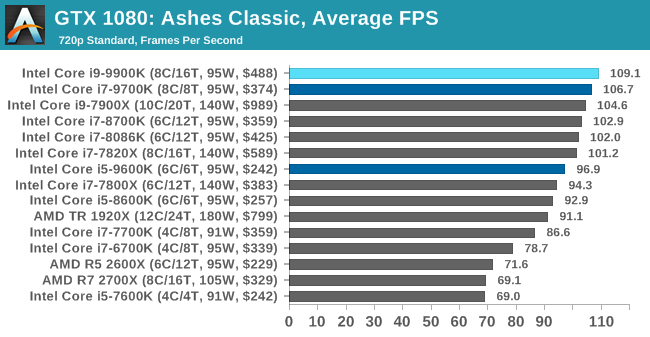 |
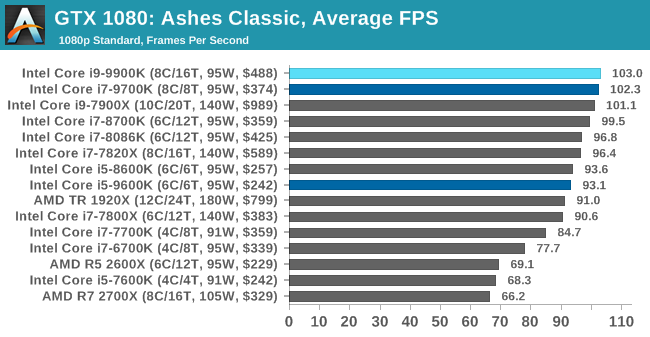 |
 |
 |
| 95th Percentile | 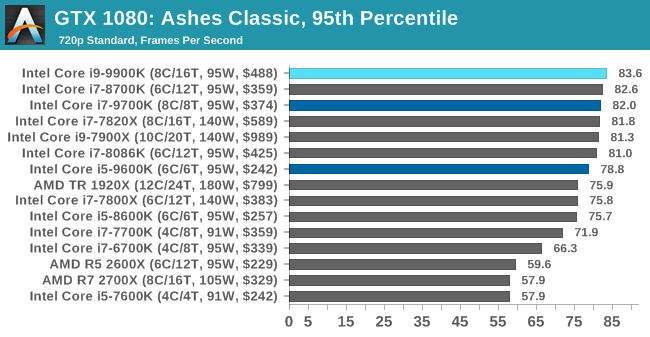 |
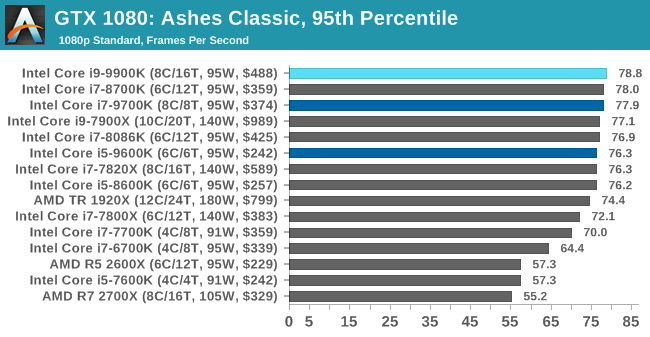 |
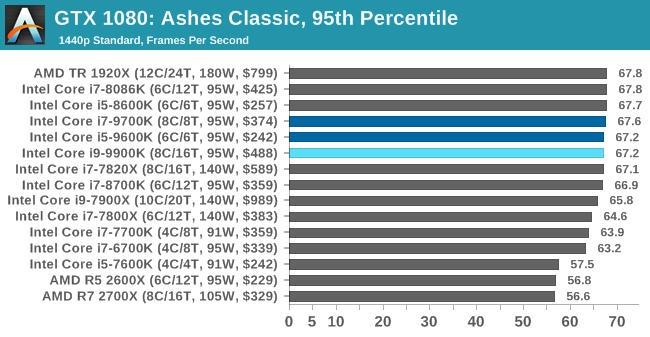 |
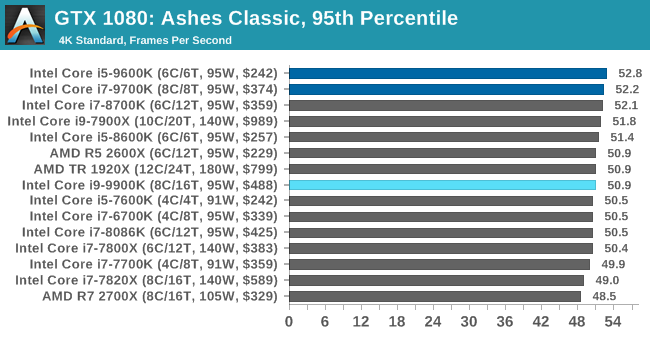 |
As a game that was designed from the get-go to punish CPUs and showcase the benefits of DirectX 12-style APIs, Ashes is one of our more CPU-sensitive tests. Above 1080p results still start running together due to GPU limits, but at or below that, we get some useful separation. In which case what we see is that the 9900K ekes out a small advantage, putting it in the lead and with the 9700K right behind it.
Notably, the game doesn’t scale much from 1080p down to 720p. Which leads me to suspect that we’re looking at a relatively pure CPU bottleneck, a rarity in modern games. In which case it’s both good and bad for Intel’s latest CPU; it’s definitely the fastest thing here, but it doesn’t do much to separate itself from the likes of the 8700K, holding just a 4% advantage at 1080p. This being despite its frequency and core count advantage. So assuming this is not in fact a GPU limit, then it means we may be encroaching on another bottleneck (memory bandwidth?), or maybe the practical frequency gains on the 9900K just aren’t all that much here.
But if nothing else, the 9900K and even the 9700K do make a case for themselves here versus the 9600K. Whether it’s the core or the clockspeeds, there’s a 10% advantage for the faster processors at 1080p.


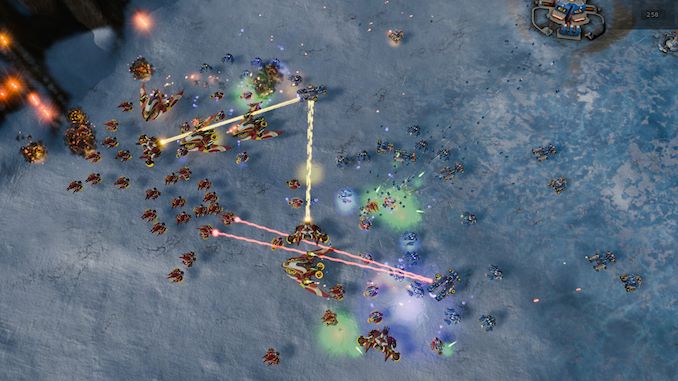









274 Comments
View All Comments
mapesdhs - Sunday, October 21, 2018 - link
Tell that to AutomaticTaco, his posts read like a shill mission atm.PG - Saturday, October 20, 2018 - link
How is the 2600X beating the 2700X in Ashes ?How is the 1800X beating the 2700X in AES?
2700x results are too low in some areas.
Nikorasu95 - Saturday, October 20, 2018 - link
Did I just fu*king downgrade by purchasing the i9 9900K when I have the i7 8700K? Like WTF? Some gaming results show the i7 is beating the i9. Like what is going on here? The i9 should be ahead of both the i7 8700K, and 8086K in all gaming tests considering it has 2 extra cores. Once again WTF is going on here with these results? They are inconsistent and make no sense!eastcoast_pete - Saturday, October 20, 2018 - link
@Ian / Anandtech: With the high premium over the MSRP for a 9900K, the difference vs. an 8700K is easily $ 200 as of now. So, here a suggested comparison that even stays in the Intel family: A comparison of a system with the 9900K with the (obligatory) high-end air cooler (so, another $ 100) vs. an 8700K based system at the same price point. Both with the identical graphics card (1080 GTX or 2070), but with the money saved with the 8700K then spent on delidding, a nice liquid cooler AND really fast DDR4? I believe that latter could really make a difference: While Intel's memory controller specifies rather slow DDR4 RAM, it's well known that one can effectively make use of much faster DDR4 RAM, and that has been shown repeatedly at least for the 8700/8700K. So, in a dollar-for-dollar matched comparison, would the 9900K then still be the king of the hill? I, for one, doubt it.eastcoast_pete - Sunday, October 21, 2018 - link
I have to recall my own comment, after checking prices at Newegg and Amazon. The current Intel 14 nm shortage has now also driven 8700/8700K prices far above their MSRP. This invalidates the performance/price = value equation my comment was based on, although the 8700K is still notably less than the even more overpriced (and out of stock) 9900K. Right now, building an Intel i7 rig is really questionable, unless one really, really wants (thinks one needs) those last few fps in some games and has plenty of money to burn. Assuming one uses the same video card, a Ryzen 2700 (or 2700x) setup with 16 GB of fast DDR4 RAM is cheaper, and if overclocking is on your mind, spend the difference to an 8700 (K or not) on a good liquid cooling setup.mapesdhs - Sunday, October 21, 2018 - link
For gaming, what it effectively does is push the "on the same budget" equation firmly into the camp of buying a 2700X and using the saving to get a better GPU. Only time this wouldn't apply is if someone does not have any kind of budget limit, but that has to be a tiny and largely irrelevant minority.SaturnusDK - Tuesday, October 23, 2018 - link
If you're planning to have a decent GPU and game at 1440p or higher then absolutely no Intel CPUs, at any price point, at the moment makes sense to buy. The 2700X is less than $300 at the moment, about half the price of a 9900K, and the 2600 is $160 at the moment, about half the price of a 8700K. Both AMD CPUs match or is only marginally behind the respective core/thread Intel equivalent at double the price.coburn_c - Saturday, October 20, 2018 - link
Under the Mozilla Kraken label you have a power consumption graph.Rumpelstiltstein - Saturday, October 20, 2018 - link
"Intel Core i9 9900K: The fastest gaming CPU"Uh, really Intel? Looks like that's the 9700K.
The Original Ralph - Saturday, October 20, 2018 - link
Looks like all this might be a moot point for awhile: Amazon hasn't started shipping, Newegg is not only stating "out of stock" but "NOT AVAILABLE" and B&H photo is showing availability date as "JAN 1, 2010" - i kid not. Suspect there's an issue with intel deliveries